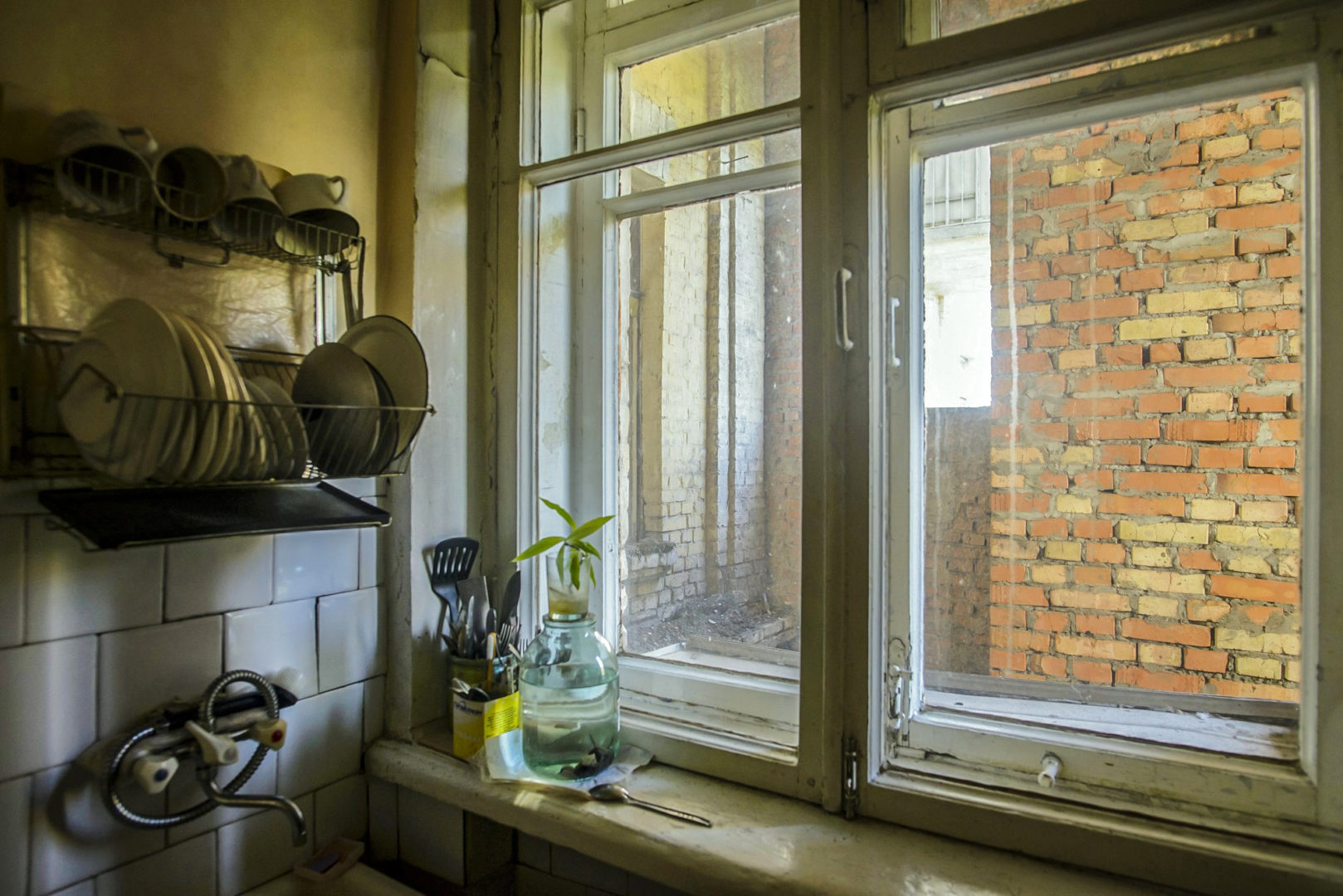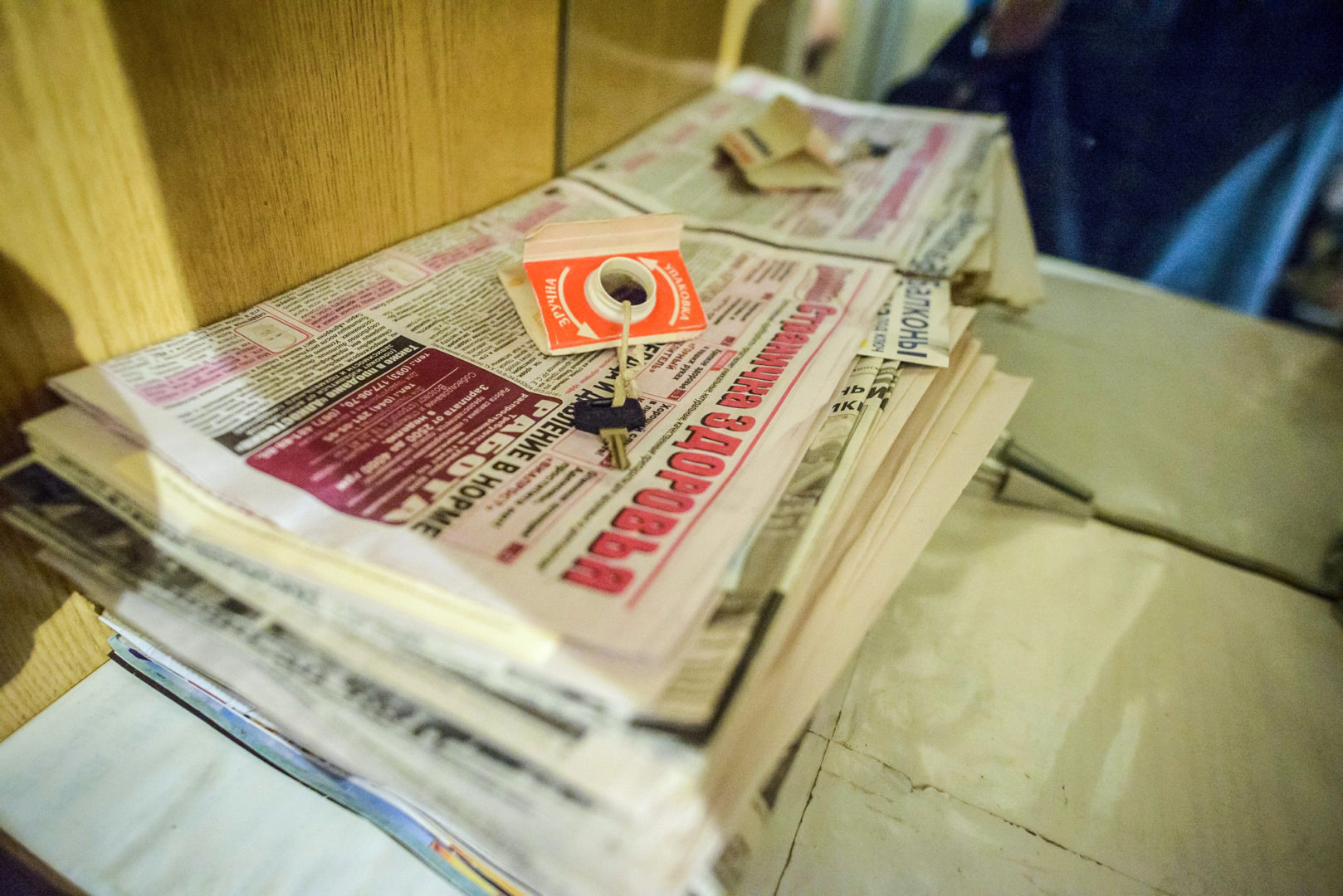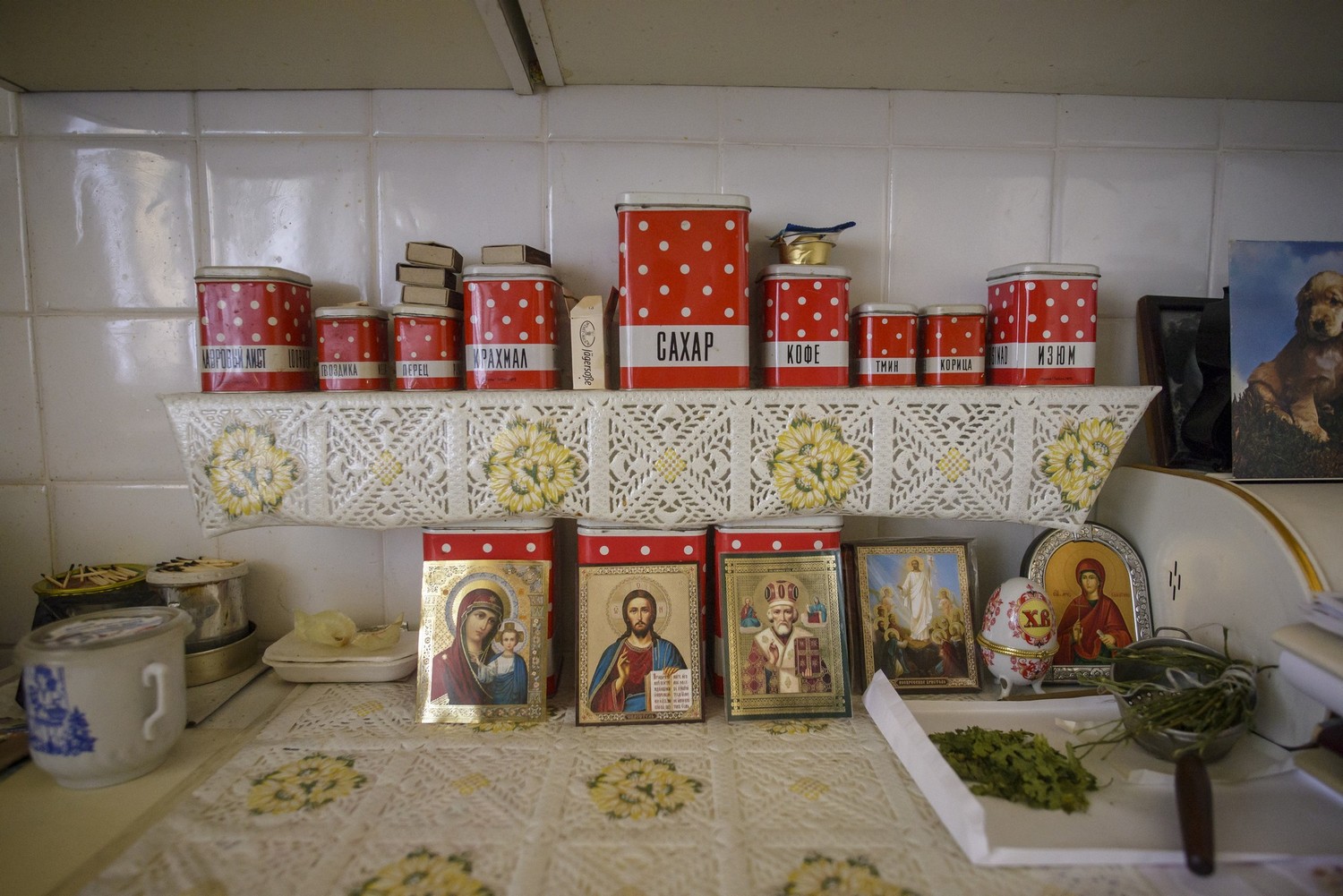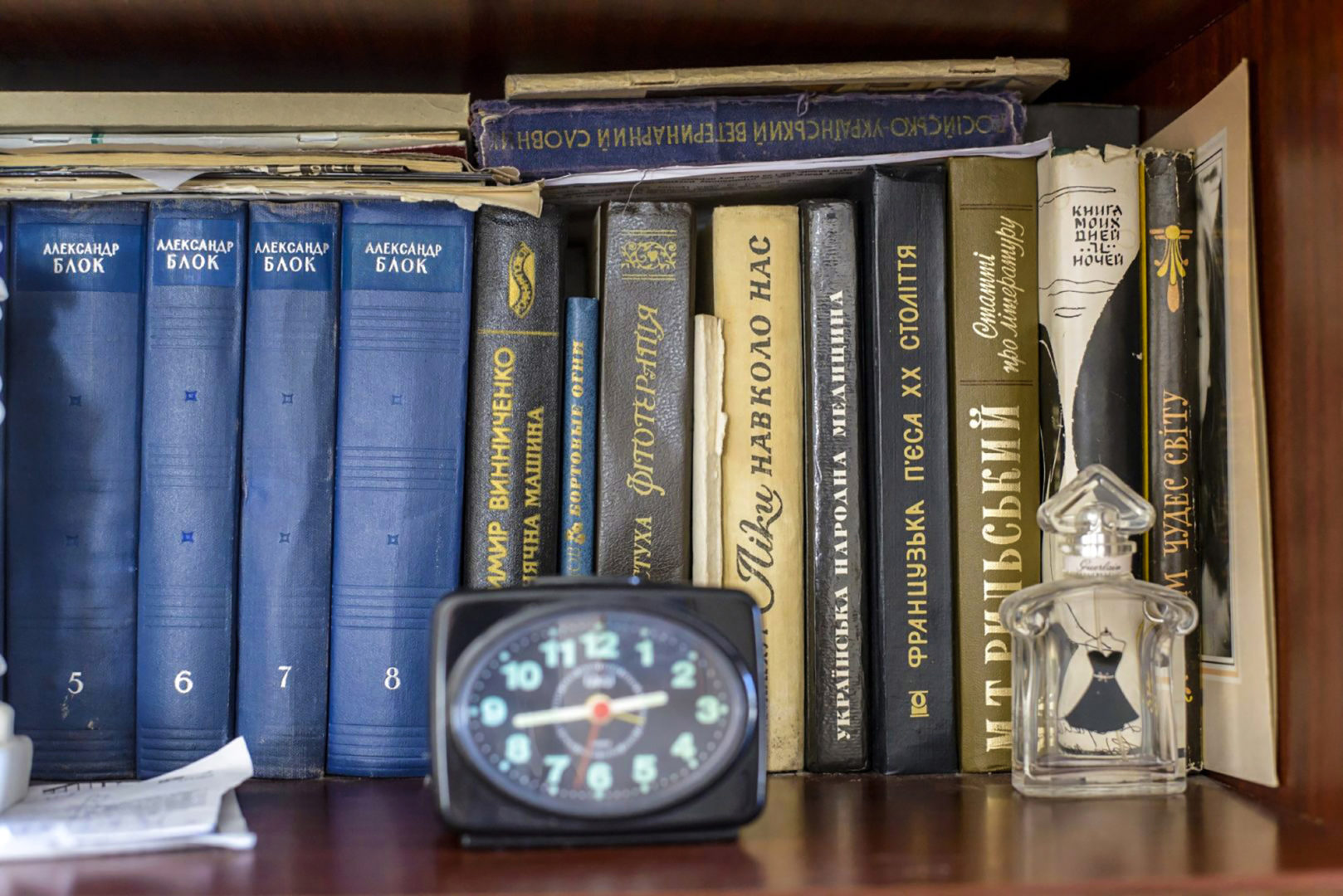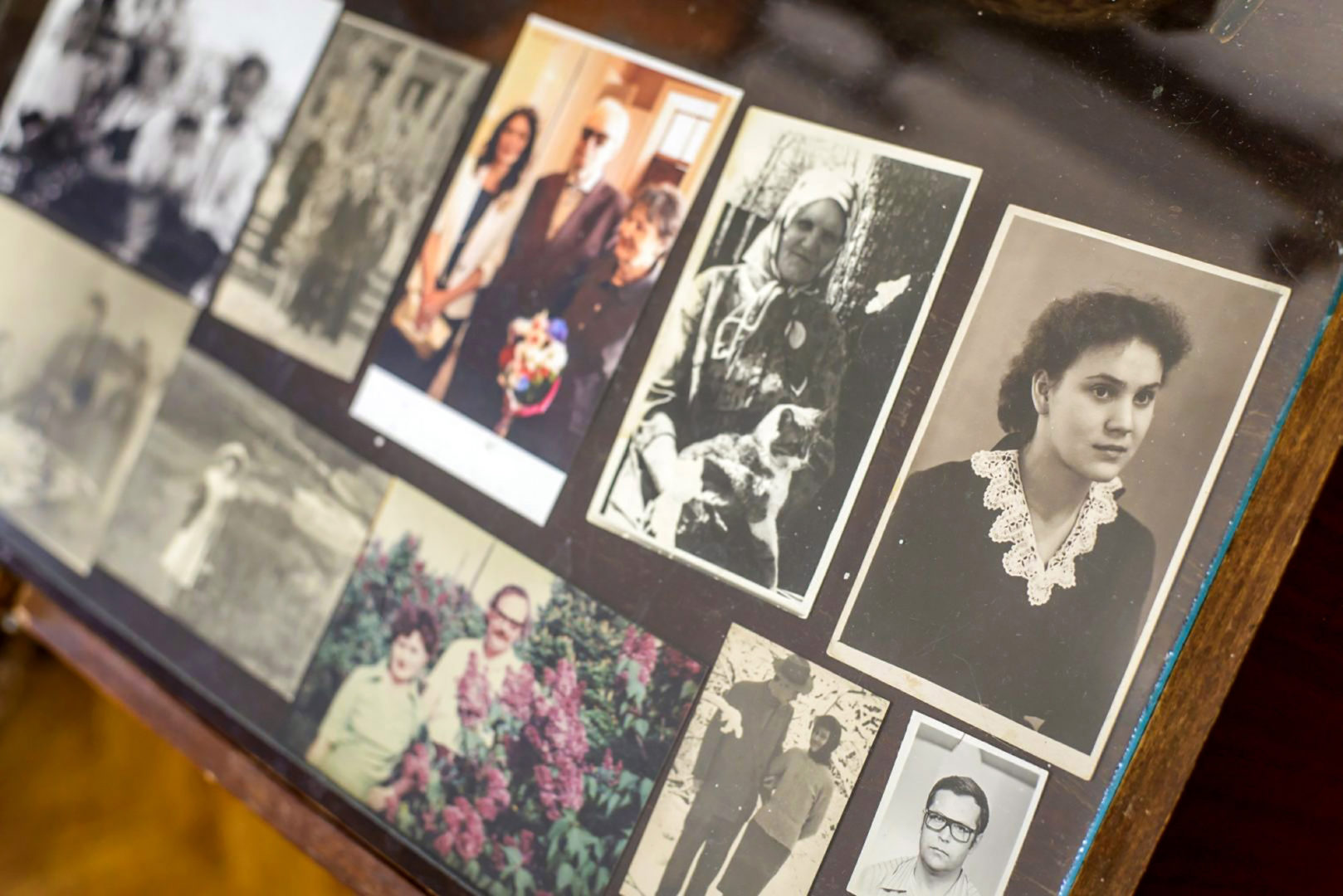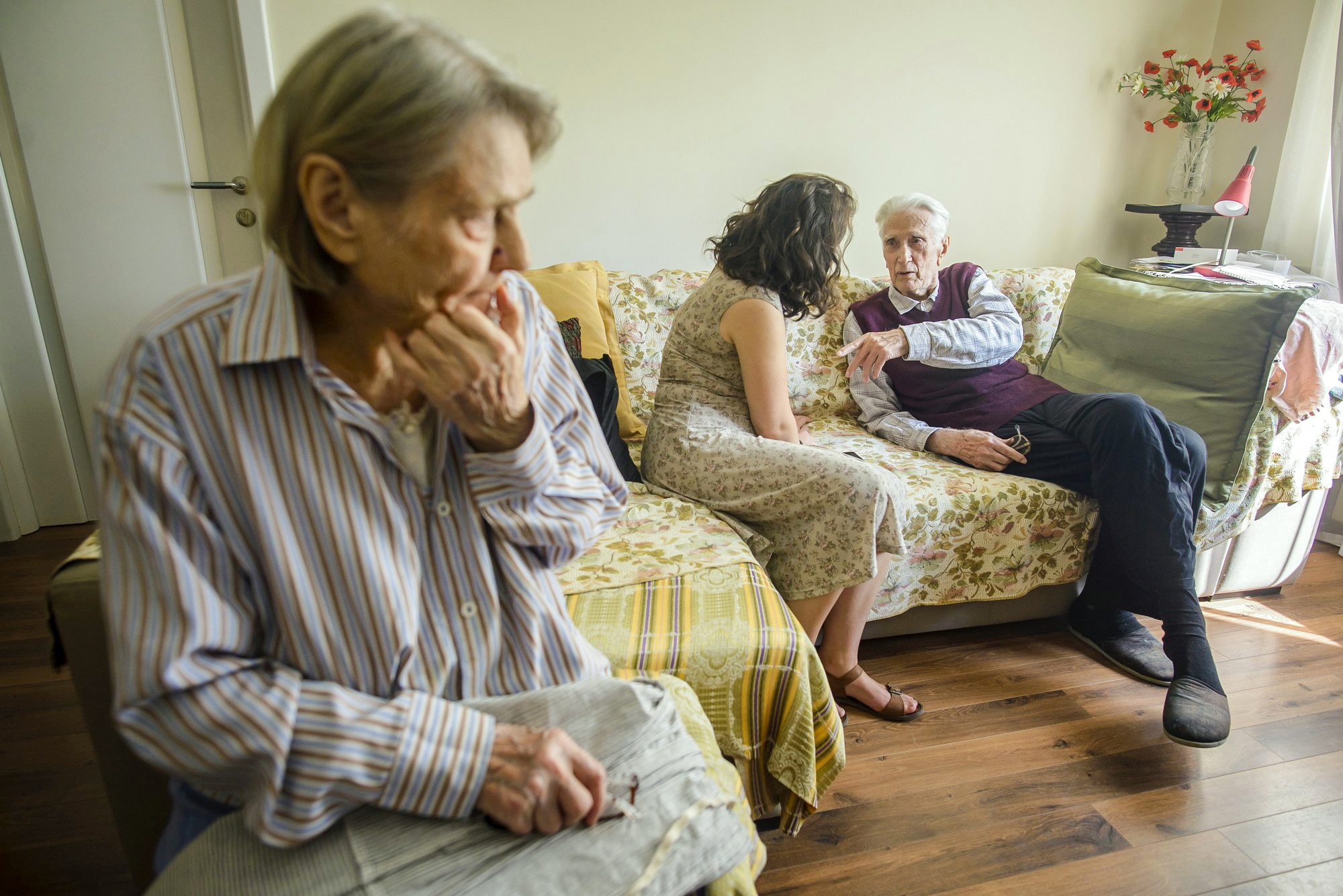
Starenki
The Starenki Charitable Foundation (starenki is the Ukrainian word for “the elderly” — R.) was established in 2014, when a group of enthusiasts first went to Kyiv’s single elderly men and women to bring them food. Since then, about a hundred volunteers have joined the cause, delivering nearly 3,000 packages with food and necessities to the elderly over five years. The Foundation currently operates in three districts of Kyiv and Dnipro. Volunteers and social workers visit the elderly who are left alone and need help. Some of them actually have families, and still they are alone, sitting within the confines of four walls, while their children and grandchildren either live abroad or simply do not help.
Each of the 70 packages includes pasta, buckwheat, sugar, oil, four jars of sardines, detergent, soap, honey, tea, two packs of Maria cookies, sweet wafer rolls, sweets.
One spare bottle of oil is left. It would be bad if it was meant to go in any of the packages, but was forgotten. So Katia the volunteer looks through the wrapped packages in search of the incomplete one. This young woman has been here for more than a year. She recalls that her first visit was to bedridden people, and it was difficult for her psychologically. But she visited them again and again, nevertheless.
“It must really be a spare one,” she says, finally deciding on the oil, and we put notes in the packages for the single old people.
“This food package has been brought to you by the Starenki Charitable Non-Profit Foundation.”
Underground Tango of Donbas
There are many public gardens in Pecherskyi district. Maryna, one of the volunteers, parks her car near one of them. It is small, surrounded by five-story apartment buildings. While it is warm outside, you can sit on the benches among the trees. This way, Yevhenii Hryhorovych does not feel alone. For five years, he has been coming to the park near his house just to chat.
“People as old as I am come and go. I do not bother those who don’t wish to speak, like the young woman in her sixties. When we just moved here, I used to go to the park daily, but now it’s every third day. I come out to the balcony and breathe. Not much energy left when you’re 92. ‘Hold on, hold on,’ everyone says.”
He loves parks: kids are running around, laughing, playing. But when moms come with their strollers, he has to go. You cannot talk to them: they are afraid you will wake up the baby.
Yevhenii Hryhorovych has a wife always waiting for him at home, but he can no longer talk to her, as the woman has almost lost her memory.
“I was young when I came there, and he was my superior,” is the only thing that the woman tells us, and laughs. She smiles to herself all the time as she sews flounces to a striped dress.
They met at the factory: she was a trainee, he was a shift supervisor. She was 23, he was 26. They married after the war, without a wedding gown or celebration—got a marriage certificate, simple as that. On their dates, they used to go dancing
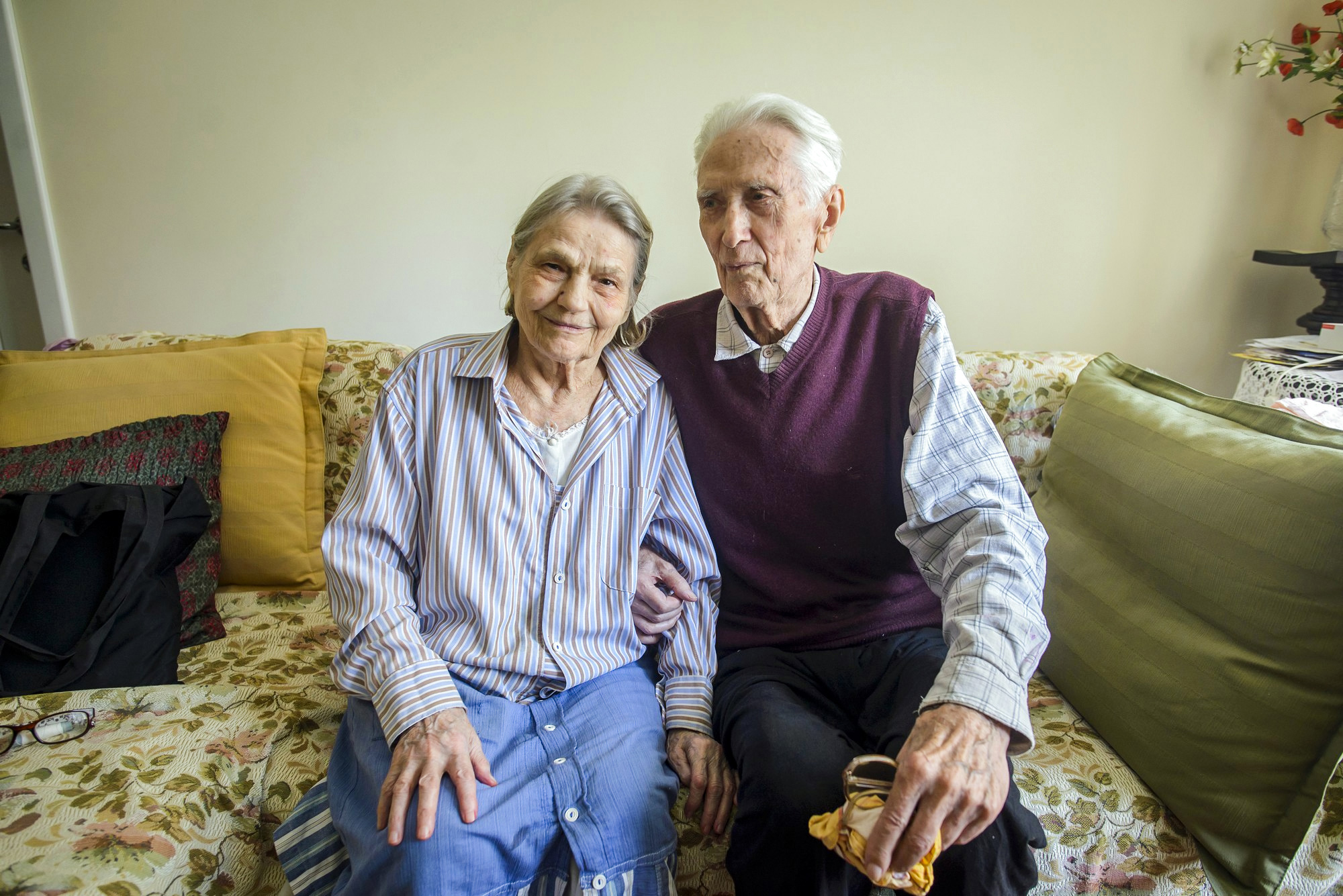
She loved to sew in her youth—and she still does, bending down, looking closely at the small stitches. She hasn’t been able to remember her relatives for five years now, but always recognizes Yevhenii Hryhorovych.
They met at the factory: she was a trainee, he was a shift supervisor. She was 23, he was 26. They married after the war, without a wedding gown or celebration—got a marriage certificate, simple as that. On their dates, they used to go dancing. In their youth, waltz was allowed, unlike tango or foxtrot. However, the technical college, which Yevhenii Hryhorovych attended, offered dance classes, where theatre and ballet actors secretly taught both tango and foxtrot. They brought a harmonica, an accordion, gramophones, radiogramophones—and taught their students everything.
Photography was another passion of his. Most of all, he liked to take photos of landscapes, especially in Georgia. He says he had no special talent but a German Welta camera. He took black and white photos, and sepia ones, and painted some of them. Almost all the albums were left in the old flat given to them by the factory, a flat in a post-war building with a garden.
For five years, Yevhenii Hryhorovych and his wife have been living in another two-room flat. There is a piano against the wall that no one knows how to play. There are books in the bookcase that no one reads.
“My sister, and her daughter, and her granddaughter played the piano. There is nothing that belongs to us in here. We were just settled here.”
All of their belongings remained in Donetsk.
Yevhenii Hryhorovych was fourteen when he fled the war of 1941. It took him and his family a month to get to Stalingrad, only to come back and rebuild Donetsk with his own hands three years later: build houses, bridges, clean the river, plant flowerbeds on community cleanup days. When the 2014 war broke out, his daughter moved him and her mother to Kyiv. Now she occasionally visits to help but does not live with them. They have lost all ties to Donetsk.
“This war in Donbas… They kill and kill. I can’t watch the news at all.”
Yevhenii Hryhorovych does not watch TV or read. Occasionally, he listens to the radio. His way of connecting to the world is an old tablet.
“I love watching what is happening in the world. In the Soviet Union, we knew nothing, and now you can watch videos about Europe, Japan, America.”
He is looking for places in the Far North where his friends went to live—he knows the addresses from their letters. So he looks at the places they wrote him about in his youth. Those settlements are often poorly populated. He also loves watching videos about the Caucasus.
“I travelled all over Ukraine by car, drove my family to the Caucasus in 1963, searched for places Lermontov wrote about in Pyatigorsk. And now I find it all on my tablet. I see how things have changed. But I revisit those roads. I lie on my bed and drive them again.”
And he listens to his favorite music—tango—on his tablet.
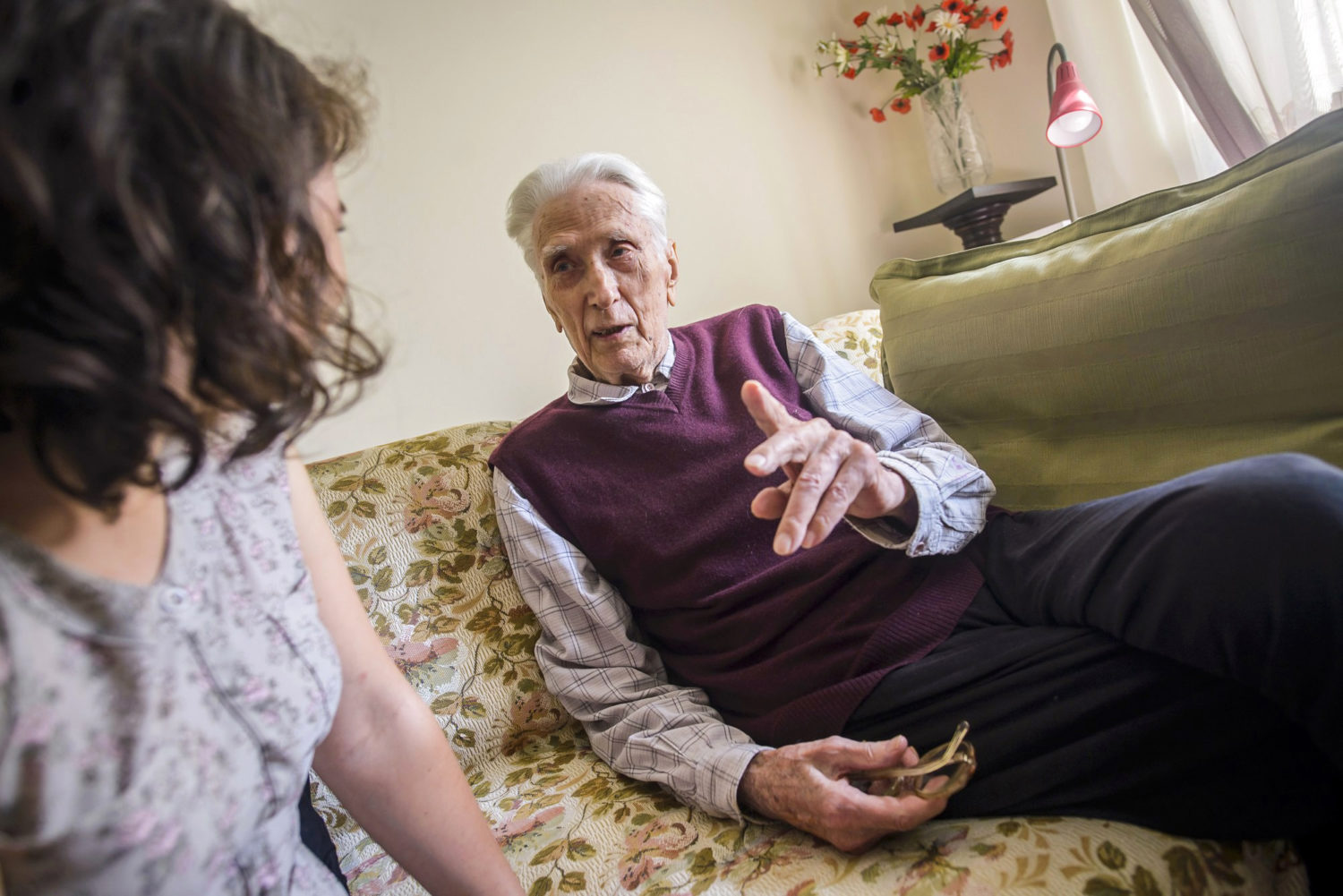
First Beauty of Bekhterevsky Lane
The doorbell rings over and over, but no one opens. The old lady waiting for a food package is hearing-impaired, lives alone, and barely walks. Despite promising to meet us, her nephew has not come and is not answering the phone. The old lady does not receive her package since we cannot leave it with her neighbors.
“That’s all because of the inheritance,” Olha, social worker, says as we move to the next old lady. “Relatives often wait for their elders to hurry up and die, leaving them their real estate in downtown.”
A downtown flat does not mean a carefree life. On the first day, our driver Maryna had to go to an old lady living among the old luxury items in her flat, which had obviously seen better days. Now, after paying her utility bills and buying her medication, she has only 360 hryvnias ($14 — R.) left for the food. For the entire month.
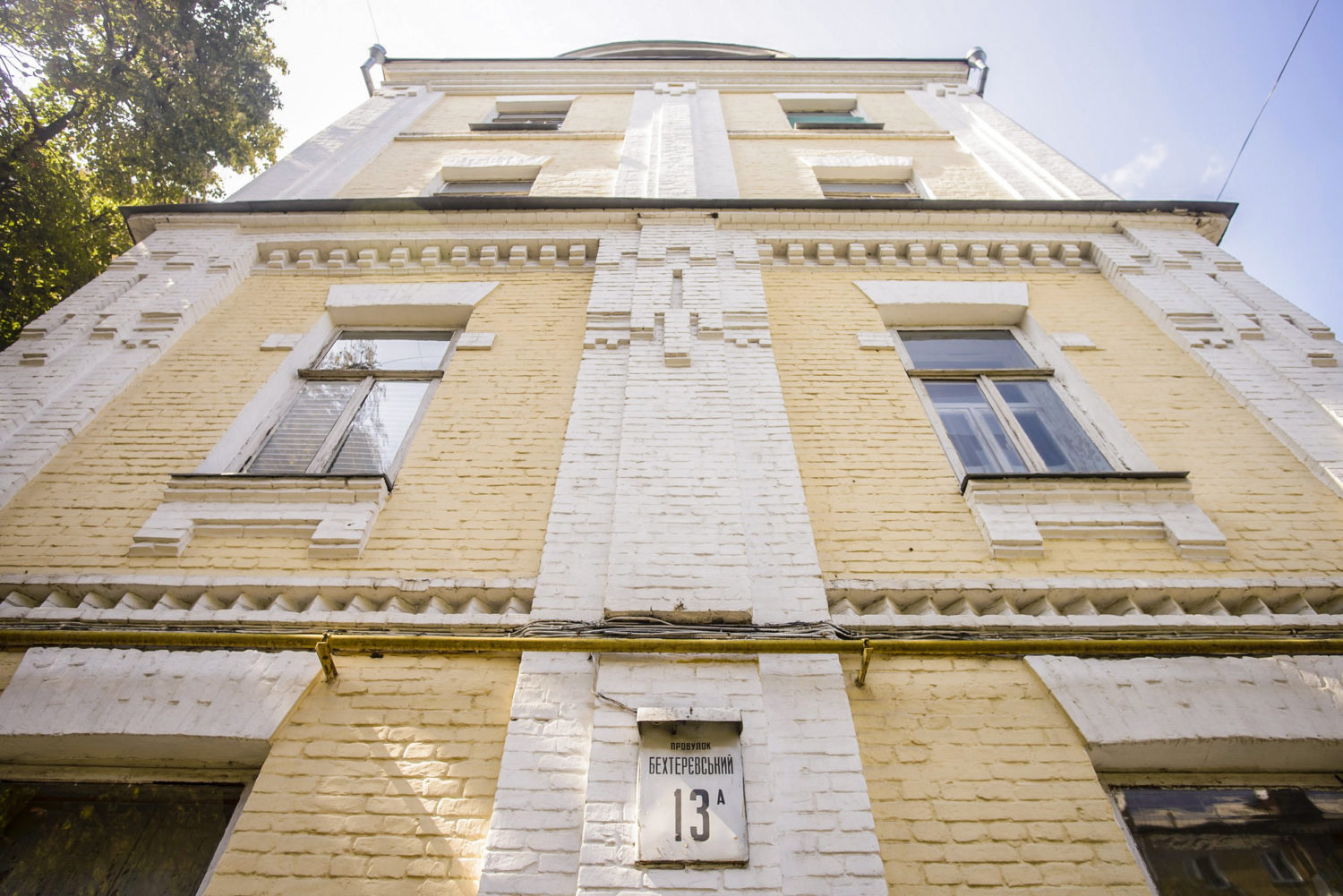
Today, Maryna has 10 packages in her trunk, giving them away one by one. We are being let in everywhere but that first flat. All recipients are lonely old ladies: slightly odd, dollied up or in their home gowns, their rooms austere or filled with junk. They are excited and scared. One of them, a woman of Jewish descent, is afraid of everyone. Another, lives in a cluttered flat with high ceilings, offers to stay and treats us to dates that are long past their prime. “Girls, I’m dying,” yet another old lady says right at the door, but the social worker explains that she constantly says that, living in dread of her daughter-in-law.
Finally, we end up in a more than century-old house with high ceilings. There is a wardrobe in the entryway, a flag of Japan on the wall, plastic flowers in flowerpots. Valentyna Vasylivna lives on the third floor.
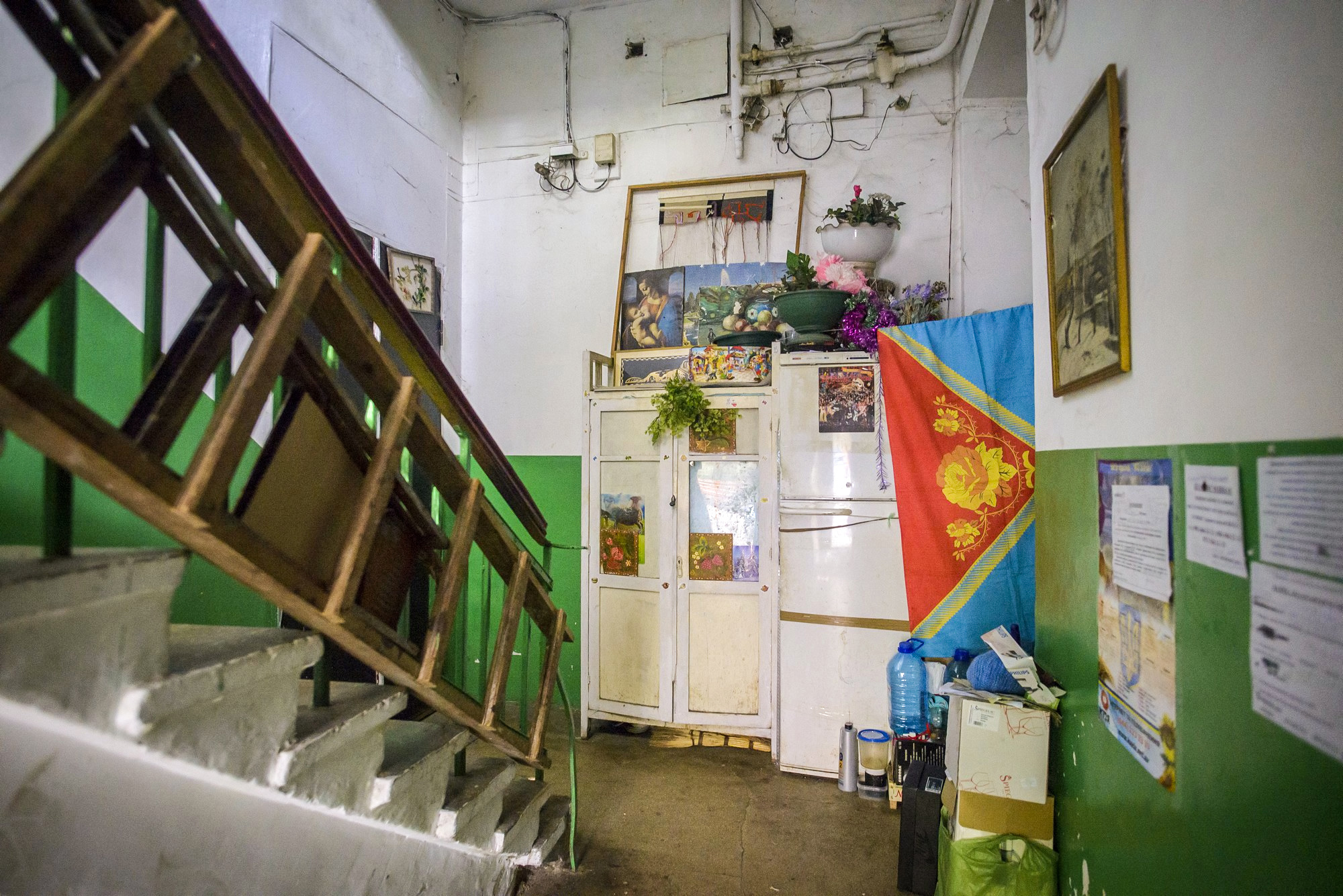
She does not let us into the rooms: despite being glad to see us, she is still afraid of strangers. Through the glass in the door, we can see the unkempt living room: photos, dinnerware, flowers, little things scattered around. The wall features a photo of a little dog that Valentyna Vasylivna once had. There are icons and cutlery in a cardboard box of medicine on her kitchen table. There are numerous forks and spoons, but Valentyna Vasylivna has been living alone for years.
When she was young, she loved to walk with her daughter near the monastery. She once met an acquaintance who lived nearby and said she was planning to move. They brought in another family, and through a triple exchange, Valentyna Vasylivna moved into her current flat. It was 1979, a quiet historic center of Kyiv with public gardens.
“I was renovating the flat: removing the parquet, painting, moving furniture. And as soon as we finally moved in, there was a fire in the neighbor’s flat. These chimneys are old, and the partitions are basically wooden. . . My renovation has been never-ending since then.”
Valentyna Vasylivna is used to fighting for her territory. When a semi-legal construction site appeared in front of the building, she collected signatures against it, called the mayor, organized protests. She tried to fight the construction through the European Court of Human Rights, but then her father fell ill and she looked after him until his death, having no time for the courts. They lost the battle: from the living room windows, you can hear the roar of construction equipment and builders cursing.
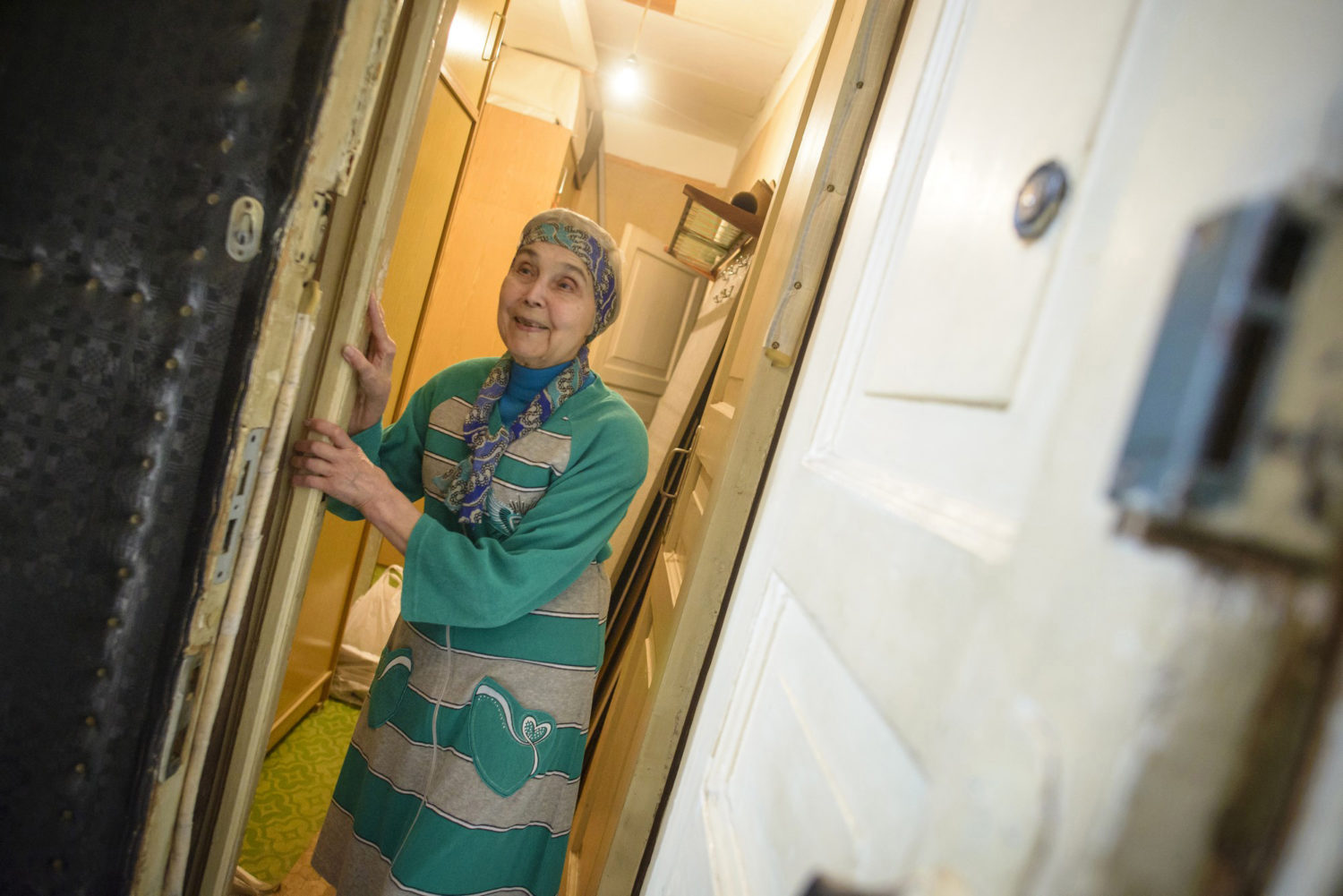
You can see nothing at all from the kitchen window, nothing except for bird droppings and a brick wall: wealthy neighbors from above have added an elevator shaft to the fourth floor. The elevator does not stop on Valentyna’s floor, but she desperately feels the consequences of its existence. She has no money to install glass in the shaft on her floor, so it has become a shelter for birds. The kitchen gets neither light nor fresh air, so she seals a half-liter jar of pickled bell peppers in the dark with the lights on.
She cannot exchange her flat as no one will agree to live in such conditions. So Valentyna Vasylivna sits inside waiting for the volunteers. She keeps her chin up, laughs when being hugged—she is ticklish—and is excited to see the social workers, blushing when they compliment her. Today, the old lady put on a blue kerchief.
“You are the first beauty of Bekhterevsky Lane!” Olha showers her with praise.
“Olya dear, what would I do without you!” Valentyna Vasylivna says, laughing. “While you are with me, we’ll be all right!”
When we leave, Olha gets in the car and says, “With them, I feel young again.”
Olha is 58.
Last Bastion of Kyiv Intelligentsia
“When I came to the city for the last time, I went to Nevsky Avenue, as usual. Looking around and above, I walked slowly from the Vosstaniya Square to the beacon of the Admiralty Spire. Suddenly, an old-fashioned carriage rushed onto Nevsky from the narrow by-street, with a coachman sitting in the front in a uniform from the times of Peter the Great, and a young couple drunk and laughing on the backseat. The carriage appeared as quick as thought, and I only got a glimpse of it, and the frightened eye of a vexed horse, stubbornly driven into the bustling traffic by a cheerful red-cheeked coachman. Frankly speaking, I was sorry for the horse. This fashionable trend here, on the busy modern city street, prompted a reflection on difficulties of coexistence of the past with the present rather than admiration.”
Anatolii Mykhailovych wrote this article for the Dnipro magazine 27 years ago. As he’s reading it, he runs his fingers along the printed lines, his skin of the same color as the old magazine paper. It was with Dnipro in 1996 that his journalistic career ended.
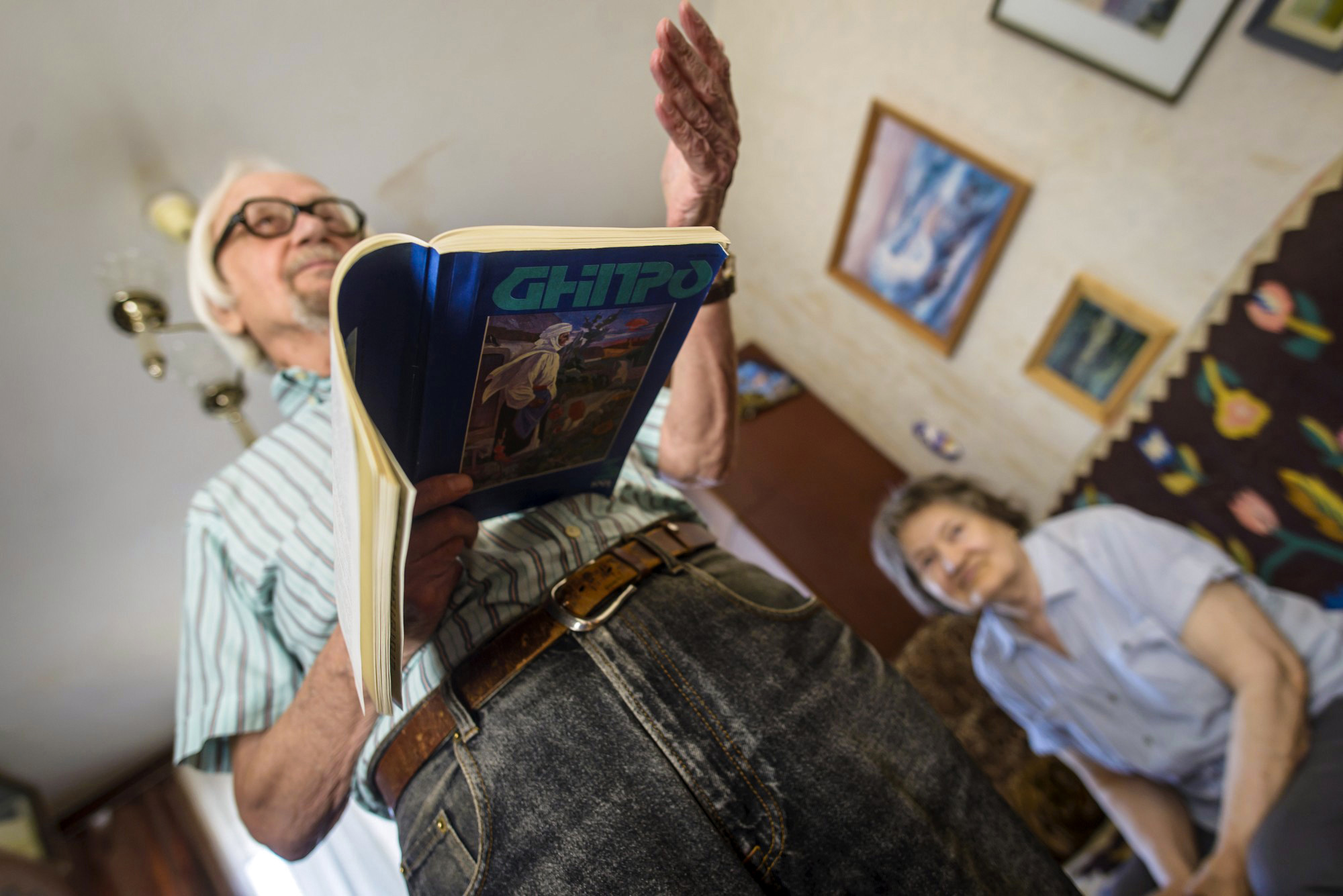
Little Tolia wanted to travel all over Ukraine. Tolia grew up and wanted to study at the Faculty of International Relations, but it was eliminated, so he went into journalism. There he chose a desk next to Svitlana. Today, they have 164 years of age between the two of them. It all started in a local newspaper, so-called rayonka, in the Kyiv region where Anatolii and Svitlana were sent to work after getting their degrees in Journalism at the Kyiv State University. That rayonka soon closed down, and the staff was transferred to Chornobyl. The family returned to Kyiv, and Anatolii became an editor at Budivelnyk [The Builder] Publishing House. He took what he could get.
Svitlana worked as a proofreader for the medical literature publishing house, Zdorovia [The Health]. They were doing what is now called the popularization of science. At the time, though, it was just pamphlets about why people sneeze or what food hygiene should be. Svitlana loved her job. Soon, she moved on to the position of the senior proofreader, literary editor, and finally the senior literary editor.
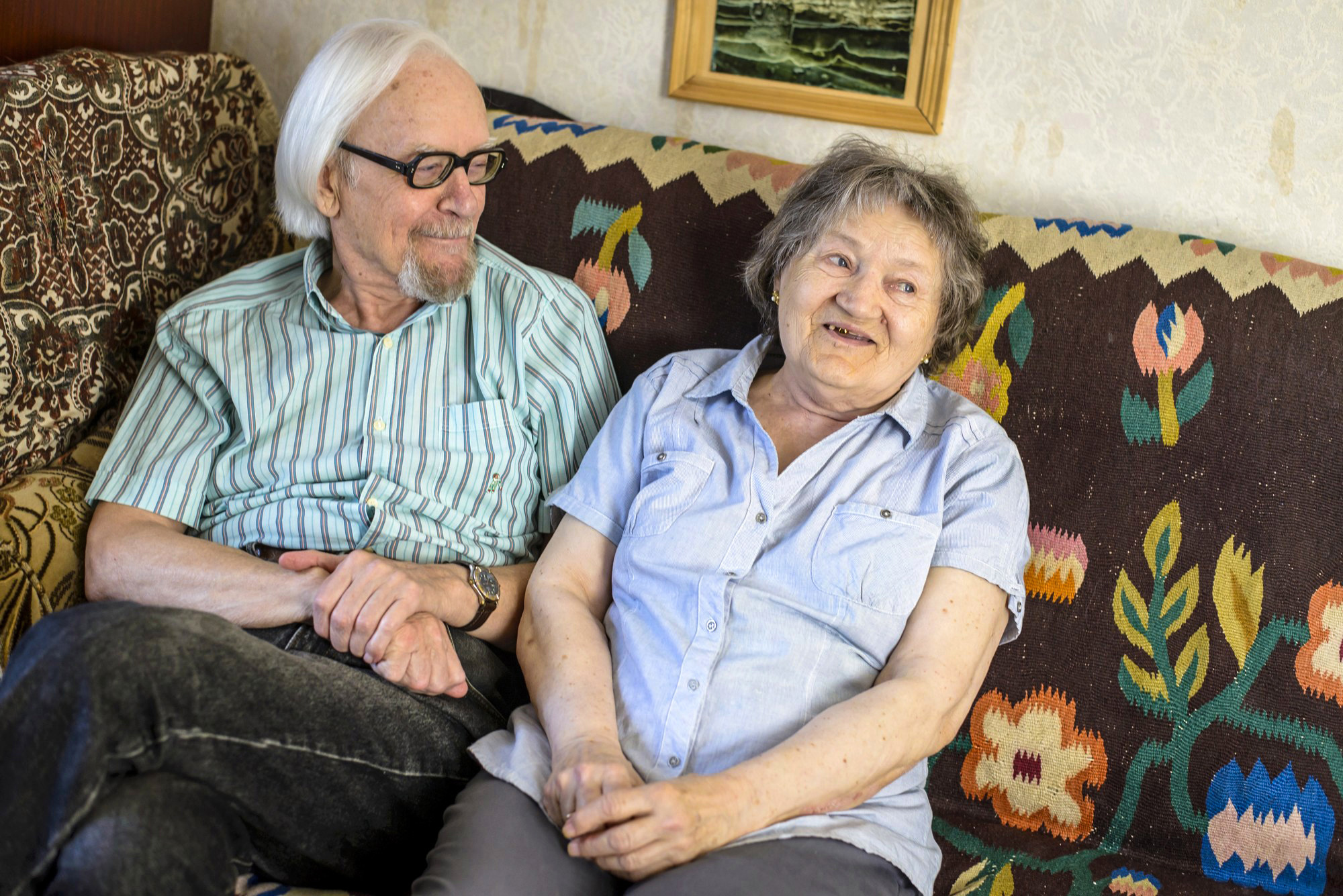
Anatolii jokes that his wife gave all her health to the healthcare publishing house. But while she was bringing work home, he did not enjoy his own job: a year later, after publishing a large book about the Kyiv underground, Anatolii left Budivelnyk. For four months, he roamed the streets of Kyiv without any employment, until he came across Ukrainian Radio—and stayed at Khreshchatyk, 26. For a quarter of a century.
“In the poetry department, no less,” Svitlana Oleksandrivna adds.
“In the poetry department. Literature of Soviet and foreign countries,” says Anatolii Mykhailovych. “Drama broadcasting.”
Little Tolia’s dream started to come true then. Anatolii travelled all over Ukraine and almost the entire Soviet Union. He liked Russia the least, the Caucasus and the Baltic States the most.
“It was a completely different world. In Estonia, Russians were, and still are, not liked. When the patrons in a restaurant spoke Russian, the waiters feigned confusion. And as we switched to Ukrainian, we immediately built an understanding. “I’m not a racehorse,” a waiter would say when asked to ‘hurry up’ in Russian. They are proud people. That’s why they preserved their culture so well, and we lose ourselves so easily.”
Anatolii’s golden dream of journalism had a reddish tinge.
“Broadcasts were recorded, transcribed word-for-word, censored—and only then aired. Live broadcasts were not an option. Now they have them on Hromadske Radio, so I listen to that station. Obviously, there’s a greater variety of topics now. I’d love to work in today’s age—it is a completely different job, one that is to my liking.”
The head of the radio committee would often say that the journalists were the transmitters of the Party’s ideas. Even if old poems about defending national interests slipped through a crack, they were removed from the air: for example, a Tajik poem about the language written 500 years ago. The censors understood this to be absurd, as did the journalists—and still crossed out the text, embarrassed. Linguistic mistakes were punished with fines, reduced bonuses, dismissals. You could get arrested for too much free thinking.
“Life was fun but scary.”
Even scarier was to be summoned to the KGB Headquarters at Volodymyrska Street. This happened to Anatolii Mykhailovych twice. He was interrogated by the investigator Nechyporenko, the one who arrested the poet Mykola Rudenko—co-founder and chairman of the Ukrainian Helsinki Group. Anatolii’s nationalistic views were reported by a secret KGB agent— there was one in every editorial office. The formal reason was receiving calls from “Yakiv Israelevych, the Jew”, who was looking for “Sonia” in Anatolii and Svitlana’s flat. Svitlana still talks about that with fear. Anatolii held up well under interrogation and knew how to respond to provocations, so he was released.
“I’m not nostalgic for those times. I yearn for my youth. It is the greatest gift. You need to live your life to the fullest. Youth is given for mistakes to be gladly remembered in old age.”
His youth was like everyone else’s: friends, parties, romantic nonsense. The Union of Journalists built a cooperative building, and colleagues settled there with their families. It took Anatolii and Svitlana 15 years to pay the mortgage in full, but they were happy. Every evening, they gathered at someone’s flat, made vinegret salad and brewed tea, sang to a guitar, danced. Svitlana is nostalgic for those times.
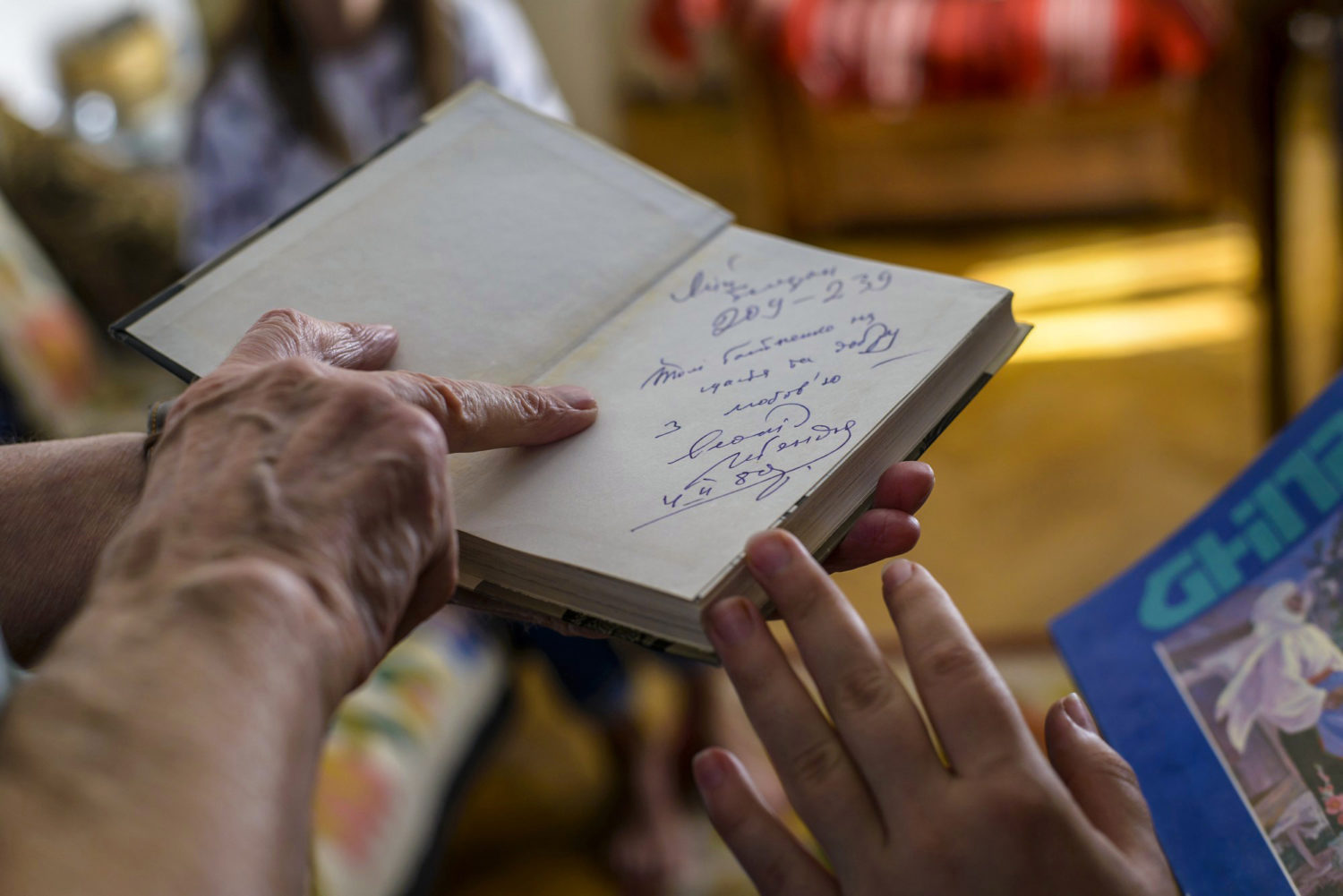
“Life has changed. Relationships between people used to be warmer. We were stupid, didn’t think about money. I thought I’d throw myself off the bridge if I failed the exams—that was my priority. And then life became hard, journalists started to sell their flats or rent them out. There is no one left now; we are not in touch with anyone.”
Not only their neighbors and colleagues disappeared; the whole artistic community Anatolii belonged to did. Once there was a wine shop on Horodetsky Street. After receiving his salary, Anatolii and his colleagues would go there for 100 grams of cognac and 150 grams of dry wine. They were joined by actors from the Franko Theatre and writers.
Anatolii is still interested in literature, though he does not read much. Among the contemporary authors, he likes Serhii Zhadan. But the books at home are mostly still Soviet; new ones would appear on the shelves after each salary. There were double rows of books in both rooms. Now, due to having problems with their vision, both Anatolii Mykhailovych and Svitlana Oleksandrivna hardly ever read. So to protect all their treasures from gathering dust, they give the books away, even sending some to the Ukrainian diaspora in Italy. But mostly, Anatolii Mykhailovych takes his kravchuchka (a makeshift hand truck — R.), loads it with books and carts them to libraries and museums, such as Shevchenko Museum and Ukrainian Song Museum, to the Diplomatic Academy. The shelves still feature Russian classics, ancient Greek and medieval literature, books about architecture, someone’s diaries, poetry anthologies, Ukrainian Soviet writers.
Inside, the flat is just as it was a quarter of a century ago. There are woven rugs on the backs of chairs and the sofa. Some are from Transcarpathia, some were bought in an art shop in Kyiv.
“We were a young Ukrainian family; we wanted to have our own style,” Svitlana Oleksandrivna says in a quiet voice, awkwardly clasping her hands. “And now as we’re living out our last years, everything is getting old.”
“The main thing is that we have not changed,” Anatolii Mykhailovych says to that, confidently spreading out on the couch. “Want a book? . .”
I yearn for my youth. It is the greatest gift. You need to live your life to the fullest. Youth is given for mistakes to be gladly remembered in old age
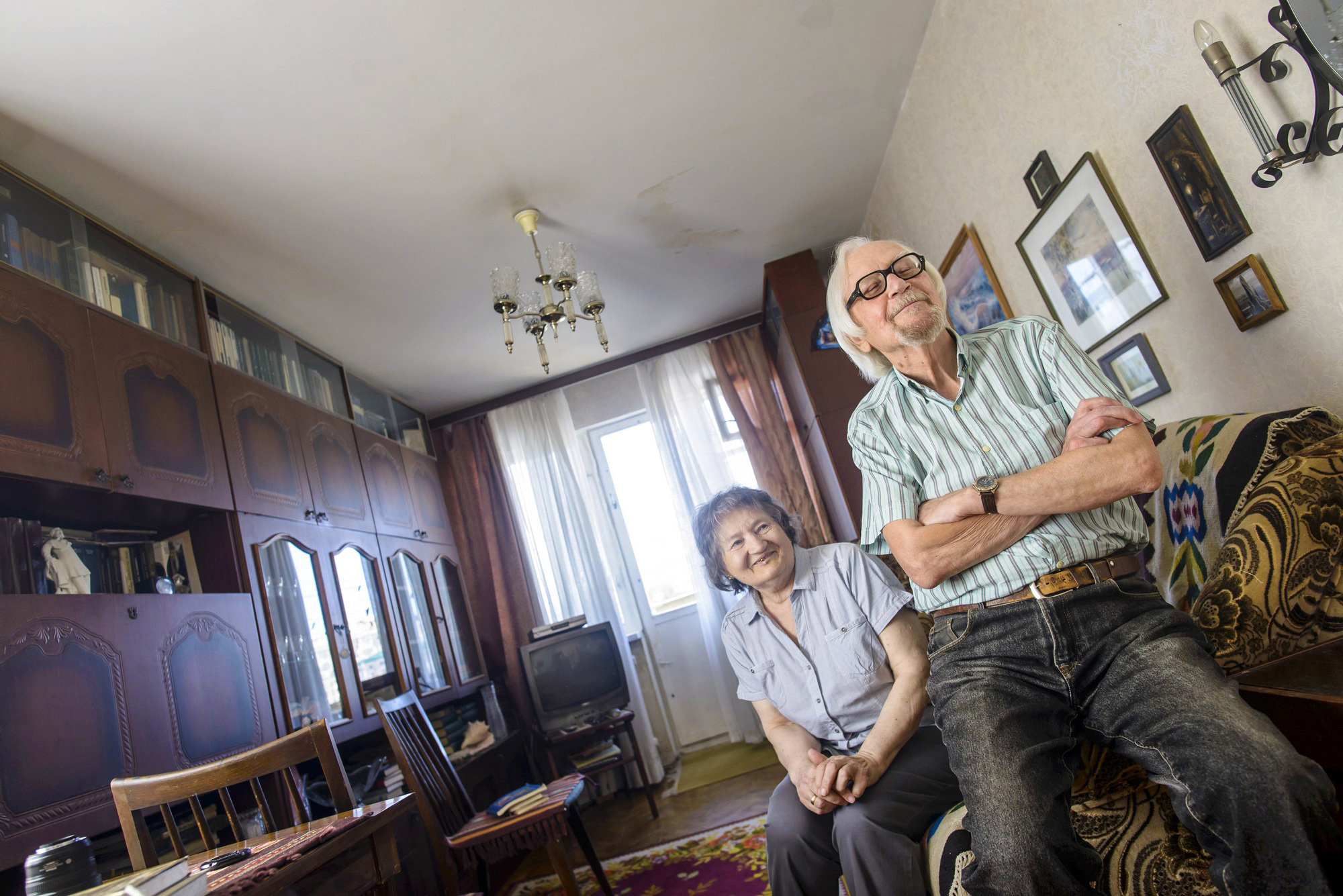
P.S. It took the whole day to deliver the packages from Starenki to Yevhenii Hryhorovych, Valentyna Vasylivna, and to seven others. Besides the sardines and soap, a conversation is much more important to the elderly. The volunteer Maryna and I have known one another for less than 12 hours, but we give each other a warm hug goodbye. She goes to the empty car, and I write to my coordinator: “We did it; everything went fine.” I carefully put the old Dnipro issue in my backpack and catch myself thinking that I need to call my parents.
[This publication was created with support of the Royal Norwegian Embassy in Ukraine. The views and opinions expressed in this publication are those of the authors and do not necessarily reflect the official position of the Norwegian government.]
Have read to the end! What's next?
Next is a small request.
Building media in Ukraine is not an easy task. It requires special experience, knowledge and special resources. Literary reportage is also one of the most expensive genres of journalism. That's why we need your support.
We have no investors or "friendly politicians" - we’ve always been independent. The only dependence we would like to have is dependence on educated and caring readers. We invite you to support us on Patreon, so we could create more valuable things with your help.
Reports130
More





